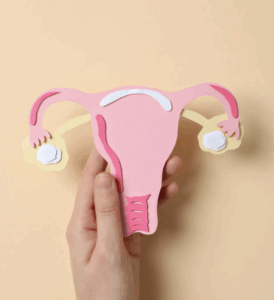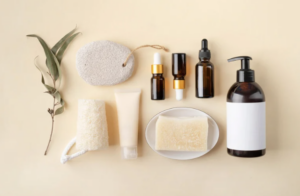The period of menopause is one of the most critical phases in a woman’s life. It usually begins in the late forties or early fifties and lasts for a few years. From the scientific point of view, it is a retrospectively diagnosed period, 12 months of amenorrhea after the final menstrual period. The age at which a woman starts to have menopausal symptoms is mainly determined by genetic factors.
During this time, at least two-thirds of menopausal women experience symptoms of menopause.
Menopause symptoms
On average, most symptoms last around 4 years from your last period. However, around 1 in every 10 women experience them for up to 12 years.
If you experience menopause suddenly rather than gradually — for example, as a result of cancer treatment — the symptoms may be worse.
Common symptoms include:
- hot flushes
- night sweats
- difficulty sleeping
- a reduced sex drive (libido)
- headaches
- mood changes, such as low mood or anxiety
- concentration and memory issues
- vaginal dryness and pain, itching or discomfort during sex
- reduced muscle mass
- recurrent urinary tract infections (UTIs)
In addition, the risks of some diseases increase during this period. Doctors pay more attention to osteoporosis, obesity, heart disease, and even diabetes. If you are in the risk group for any of the above, be sure to consult with your doctor early on.
The first recommendation is to start by checking your hormonal level and your vaginal health. Both tests can easily and effectively be made at home with ScreenMe test kits. In addition, you get the consultation of professional experts to understand your personal situation and the next steps you need to take to go through this period.
Menopause treatment
The most effective and widespread option today is to achieve therapeutic relief of different menopausal symptoms with Hormonal replacement therapy (HRT). This type of treatment is determined by a doctor and requires medical supervision. HRT includes an early administration before the age of 60 and up to ten years of amenorrhea. Customization of the dose, types of combination, annual controls, and a treatment duration of fewer than five years are guarantees of a good risk/benefit ratio.
However, if you are not ready for hormonal treatment, there are some natural tips to relieve the symptoms.
Natural tips to increase the quality of life in menopause
1. Take control of your weight
There are many factors why you might gain weight during this period: changing hormones and lifestyle, genetics or simply mood changes. Whatever the factors might be, it is important to maintain a moderate and healthy weight for your body.
Gaining excess body fat, especially around the waist, increases the risk of developing diseases such as heart disease and diabetes.
2. Calcium and Vitamin D in menopause
Calcium and vitamin D are linked to good bone health. Checking your Vitamin D levels and taking supplements, can reduce bone density and increase the chances of osteoporosis which can lead to bone fractures. Here are some foods that can increase vitamin D and Calcium.
Consider giving preferences to Calcium-rich foods in your diet:
- dairy products (milk, cheese, yoghurt)
- Green, leafy vegetables such as kale, collard greens, and spinach
- Nuts
- Tofu
- Beans
- Sardines
- Calcium-fortified foods (cereals, fruit juice, milk alternatives)
Additional Vitamin D can be found in:
- Cod liver oil
- Salmon
- Swordfish
- Tuna fish
- Orange juice fortified with vitamin D
- Dairy and plant milk fortified with vitamin D
- Sardines
- Beef liver
The bonus point in increasing vitamin D intake is, that it can boost your mood and help with low mood.
3. A balanced diet in menopause
Diet recommendations during the menopause period are very similar to a healthy lifestyle and fertility-increasing tips. So following these simple rules are beneficial not only for symptoms of menopause but also to maintain a healthy lifestyle.
Menopause diet tips:
- Drink enough water (8 – 12 glasses daily)
- Reduce refined sugar and processed foods
- Don’t skip meals, eat regularly
- Eat more protein-rich foods
- Avoid trigger foods
Certain foods and drinks can trigger hot flushes, night sweats, and mood changes. This includes caffeine, alcohol, and sugary or spicy foods. Try to find natural substitutes from the list above.
4. Phytoestrogens in menopause
Another group of helpers in relieving menopause symptoms are phytoestrogens. Phytoestrogens are naturally occurring plant compounds that can mimic the effects of estrogen in the body. Therefore, they can help balance hormones.
Rich phytoestrogens foods include:
If you need comprehensive and tailored advice for your menopause journey and need support to help you make these changes ScreenMe is ready to help you. Part of our consultation and at-home testing package includes helping you find bespoke nutrition solutions that work specifically for you. Check out your options here.
5. Exercises in menopause
It is not proven that exercises can reduce menopausal symptoms, such as hot flushes and sleep disturbances. However, regular exercise can help you maintain a healthy weight, relieve stress, and improve your mood and quality of life.
Here are some exercises you can do to keep fit:
- Aerobic activity – helps to maintain a healthy weight. Brisk walking, jogging, biking, swimming or water aerobics are in this group. Start gradually with only 10 minutes daily and build your strength up.
- Strength training – is an effective way to reduce body fat, strengthen your muscles and burn calories efficiently. Choose a weight or resistance level heavy enough to tire your muscles after about 12 repetitions. Gradually increase the weight or resistance level as you get stronger.
- Stretching – is a good way to improve flexibility. Have a stretch routine that you do after each workout when your muscles are warm and receptive to activity.
- Stability and balance – can help prevent falls. Simple exercises, such as standing on one leg while brushing your teeth can be helpful. If you are more experienced in this part, try tai chi, yoga and pilate.
Menopause is an essential part of women’s lives. There’s a lot you can do to manage and reduce your symptoms.
Take care of your hormonal balance and lifestyle, do regular health checks and get all the vitamins and nutrients your body needs.
If you are not sure where to start, ScreenMe is ready to provide you with a first discovery consultation and support you in improving the quality of your life.
Contact us to learn more and take care of yourself.







